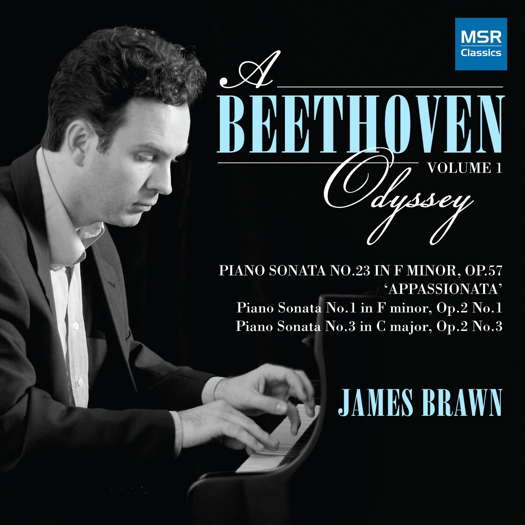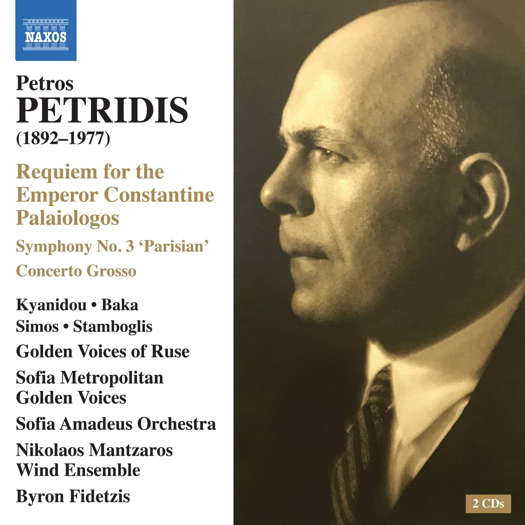 SPONSORED: CD Spotlight. Masterfully Controlled - James Brawn's Beethoven Odyssey impresses Andrew Schartmann.
SPONSORED: CD Spotlight. Masterfully Controlled - James Brawn's Beethoven Odyssey impresses Andrew Schartmann.
All sponsored features >>

Byzantine Style and Tropical Scales
GERALD FENECH listens to music by Petros Petridis
'Byron Fidetzis' impassioned conducting leaves no doubt as to the almost reverential devotion Fidetzis harbours for this rare but stimulating repertoire ...'
Petros Petridis (1892-1977), a Greek composer and conductor born in Turkey, is an eminent figure in the Turkish/Greek musical scene of the twentieth century. He studied in Constantinople at the American Robert College and received instruction in piano from Hegey and in harmony from Selvelli.
Later he went to Paris and read law at the Sorbonne and political science at the Ecole Libre des Sciences Politique (1911-14). Further studies followed with Albert Wolff (1914) and Albert Roussel (1919). Petridis became a naturalized Greek citizen in 1913.
Subsequently he was a music critic for English American and Greek publications, dividing his time between Paris and Athens. He composed his first song, Lullaby, in 1917.
Some years later he embarked on more important works, especially for orchestra, but several pieces belonging to this period were afterwards destroyed by Petridis himself, except the Cieffic Danses of 1922, the Concerto Grosso on this recording and various songs.
1928 marks the beginning of his technical maturity as a composer. At this period he wrote his First Symphony and the Greek Suite. In 1932, Petridis composed Le Clavier modal for piano, which is a codification of the polyphonic and harmonic possibilities of old modes. Until 1939, the composer produced several works of stature including the Ioanian Suite, two Piano Concertos and a Concerto for Strings. It was also during this period that he wrote his most important work until then, Digenis Akritas, a dramatic symphony in nine connected parts. The Piano Trio (1933-34) was also the fruit of this creative part of his life.
In 1950, Petridis composed the oratorio St Paul, for the celebrations marking the 1900th anniversary of the Apostle's visit to Greece. In 1958 he was elected corresponding member of the French Academy of Fine Arts, and in 1959 a member of the Academy of Athens.
His last major works are the Requiem for the Last Emperor of Byzantine, the Concerto for Two Pianos and Orchestra and the Violin Concerto. Petridis died in Athens on 17 August 1977, aged eighty-five.
At the beginning of his career, Petridis concentrated on the harmonization of Greek folksongs, but later his music included elements of Byzantine style and explored the tropical scales. The three pieces on this CD are prime examples of the composer's gradual development. Using a polyphonic musical language that draws on medieval Byzantine chant, Petridis can be considered one of the most important advocates of the Greek National School.
Listen — Petridis: Egredere, Basileus (Requiem for Emperor Constantine)
(CD 1 track 1, 0:00-0:55) ℗ 1991 and 2021 Naxos Rights (Europe) Ltd :
The Requiem for Emperor Constantine (1953-54) mourns the end of the Byzantine Empire with elegiac lyricism culminating in an ultimately uplifting finale.
Listen — Petridis: Intra, Basileus (Requiem for Emperor Constantine)
(CD 2 track 4, 3:52-4:47) ℗ 1991 and 2021 Naxos Rights (Europe) Ltd :
The Third Symphony (1941-46) is a musical tribute to France, the composer's adopted home, while the Concerto Grosso (circa 1929) enriches an older form with contemporary colour.
Listen — Petridis: Allegro vivace (Concerto Grosso)
(CD 2 track 11, 4:00-5:02) ℗ 1991 and 2021 Naxos Rights (Europe) Ltd :
This is a programme of works restored and edited by the conductor that are eminently representative of Petridis' significant aesthetic and creative achievements. Byron Fidetzis' impassioned conducting leaves no doubt as to the almost reverential devotion Fidetzis harbours for this rare but stimulating repertoire, where each performance displays its own particular virtue: Nobility (Requiem), Grandeur (Symphony No 3) and Virtuosity (Concerto Grosso).
There is not much Petridis on record, so this issue is an excellent opportunity to start discovering an imaginative but still relatively unknown voice of the twentieth century. Do not be deterred if at first hearing you think this is not music for your ears. Repeated listening will yield many hidden fruits. Sound and booklet essay are top-notch.
Copyright © 16 December 2021
Gerald Fenech,
Gzira, Malta

CD INFO - PETRIDIS: REQUIEM FOR CONSTANTINE PALAIOLOGOS
CLASSICAL MUSIC ARTICLES ABOUT GREECE
CLASSICAL MUSIC ARTICLES ABOUT TURKEY
TWENTIETH CENTURY MUSIC ARTICLES



